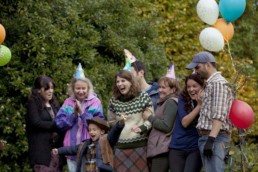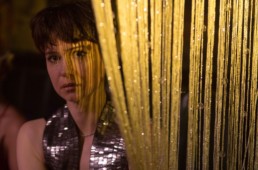'Instant Dreams' Review: For the Love of the Polaroid Film
INSTANT DREAMS (2019)
Starring Stefanie Schneider, Stephen Herchen, Chris Bonanos
Directed by Willem Baptist
Distributed by Synergetic. 91 minutes. Not Rated
An author, an artist, and a scientist. In Instant Dreams by Willem Baptist, these three have pursued questions about the past, present, and future of a medium that is considered by some to be outmoded but is now being reinvented for our digital world. When Edwin Land revealed his invention of instant photography in 1947, it was with a vision that it would change how people interacted with each other. He believed that through our desire to take photographs of others and to share these images with each other, we reveal our curiosity, our tenderness, and affection we have for humanity. With instant photography, we could become closer and kinder to each other.
Christopher Bonanos, an editor at New York Magazine as well as an author, also believes in the social nature of analog instant photography. It is as simple as taking a photo and talking while waiting for the photo to develop. Or to see everyone at a party gather around the photos to see how they turn out and then ask for their own. Or to give the photo as a gift, one that is unique and irreproducible since instant film does not have a negative or a digital copy.
Stefanie Schneider, an artist from Germany who takes many photos in the American desert, has made her life’s work in analog photos and keeps hundreds of them in safes in Berlin. On screen, she muses about where her life will go once all the film she has stocked up on expires and becomes unusable. She talks about how digital photography has led people to obsess over “moments” and considers how analog photos seem to have a sense of time and history (to Bonanos, it has dimensions compared to the flatness of a digital image).
We are also introduced to Stephen Herchen, a top scientist who works at the Impossible Project, searching for the right chemical formula that will resurrect instant film. It is his dream to bring it back. And in his laboratory he and others persist in trying new formulas and if they fail, trying again.
Instant Dreams does not offer specific historical details about the growth of Polaroid or how the Impossible Project is reviving the medium after Polaroid stopped producing instant film in 2008. But through its beautiful visuals, sweeping music, and all the stories of these three people who are captivated by instant film, Instant Dreams successfully conveys the love people have for the medium and why: the tactile sense of it, the smell and the action of pulling it from the camera and waiting for the picture to develop. The complex chemical reactions and side reactions that occur right in the film is like a living thing. It's mysterious, a moment of frozen time. It is an especially hopeful feeling to see how people like these three are trying to keep it alive in their own way, whether it’s by reinventing the chemical formula of the film, recording its history, or ardently using it for their art.
It is the persistence of this passion that has revived instant film. Though she is not the main subject of the documentary, there are moments we follow a young woman around Tokyo. She takes selfies with her smartphone camera and represents very much the future of our relationship with photography and cameras. Towards the end of the documentary, she uses an Instant Lab Universal. Developed by the Impossible Project, now rebranded as Polaroid Originals, you can turn any picture on your phone into a Polaroid photo. Werner Herzog even voices an app that tells you how to use it. It is not exactly the future that Edwin Land envisioned for his technology- if anything, his prediction of the future was closer to smartphones and their cameras- but I imagine that it was with much joy, especially from Schneider, Bonanos, and Herchen, that instant film has returned in its own way and with it, a wonderful way to capture and reflect our lives.
'Adult Life Skills' Review: Thirty and Not Thriving
As a feature debut from writer-director Rachel Tunnard, Adult Life Skills focuses on Anna (Jodie Whittaker), a soon to be 30-year-old who lives in a shed in her mother’s backyard.
Both at home and working at the outdoors center in her rural English town, Anna spends much of her time making videos. Drawing faces on her thumbs, she films them asking existential questions in a spacecraft she made out of silver painted cardboard and aluminum. If not that, she’s sticking pinwheels in molehills, microwaving her wet clothes, or finding faces in unlikely places like an egg carton or a slice of bread. Ever since Anna's twin, Billy (Edward Hogg), passed away, she chose to live in the shed. She’s been there 18 months and the shed is filled with pictures, toys, cameras, as well as Billy’s old stuff. Renewing her twin’s website where he posted the videos they made together, she’s very much settled to live in grief but her mom (Lorraine Ashbourne) puts on the pressure for her to move out or at least to consider dating the hairdresser with the mullet and Ugg Boots.
It becomes clear that Anna will not be allowed any more time to stew in her sadness as Clint (Ozzy Myers), a blunt and annoying neighborhood boy who is dressed as a cowboy, is put in Anna’s care. Like Anna, he is dealing with his own sadness when his mother falls ill and is sent to the hospital. They build a tentative friendship and eventually Clint hands her a picture he drew. But in this movie, everyone’s a little mean from the hurt and anger. Clint steals Anna’s camera and videos after he finds that his picture he gave her was ignored and stepped on. Marion, Anna’s mother, nails the shed door shut with 2x4s and cuts open the tent that Anna sets up outside. Anna even gets into a fight with her friend Fiona (Rachael Deering) who calls her out for being selfish. In the end, there is no moment of quiet closure for Anna that allows her to resolve her grief. Her twin’s website has been shut down because of an expired credit card and the molehills where she stuck pinwheels have been sectioned off so that the moles can be killed by pest control. When she finally finds Clint, who has run away, she asks him to blow up her shed, not because she’s ready to move on but because she’ll ruin everything if she doesn’t.
A lot of the film focuses on Anna rejecting everyone’s attempt to pull her out of her grief but one of the more touching moments is a small scene with Clint. To fit with his cowboy costume, Anna gives Clint a leather holster that her grandmother made for him. It brings up a point that maybe the best we can do in moments like this is to give and care for each other. As her best friend had brought up, other people are unhappy too. Clint. Marion. The grandmother. They’re all dealing with their own issues and trying to live their life too.
There is a moment after her meltdown that Anna asks Brendan (Brett Goldstein), an awkward writer who’s interested in her, whether she is still a twin if her twin is dead. It’s one of the few heartfelt moments in the film. Yet Adult Life Skills doesn’t delve too deep into the question or its answer. Perhaps it is, for Anna’s sake, not something she needs to answer. Instead of wallowing too deep in these sort of questions, the best thing to do is to move on, as Anna does with the help of her friends and family.
'Adult Life Skills' is not rated. 96 minutes. Opening at the Arena Cinelounge this Friday.
'State Like Sleep' Review: A Murder Mystery in Brussels
State Like Sleep, written and directed by Meredith Danluck, starts with the supposed suicide of a famous Belgian movie star, Stefan Grand (Michiel Huisman).
Unable to deal with his death, Stefan's wife, Katherine (Katherine Waterston) leaves the forensics scene midway as well as the entire city of Brussels where he died. It isn’t until a year later when she receives a call about her mother being in a hospital in Brussels that she must return and untangle the mystery around Stefan’s death. Upon her return to the city, Katherine discovers that her late husband's last call was to Emile (Luke Evans), a man who is associated with ‘Lebellfleur’, a gentleman’s club that services rather niche desires. Katherine visits the club and is confronted by Emile as he cartoonishly tells her that Stefan had secrets which would be better left undiscovered before she gets hurt. Yet when we learn that Stefan’s secret was a drug problem, it seems like a rather modest secret for a celebrity.
Michael Shannon brings the charm as a neighbor turned lover
Other questions Katherine asks about Stefan’s death also have anticlimactic answers: it really was a suicide; the photos of Stefan with another woman were of him and his therapist; the money in Stefan’s locker was not for anything suspicious; instead, it was his apology to her for everything, for his suicide and their failing relationship. And in another subplot, we meet Michael Shannon’s character, Edward, who lives in a neighboring hotel room and who initiates a relationship with Katherine.
The "Murder Mystery" aspect isn't so mysterious after all
The film starts off with the question of whether Stefan really died by a gunshot suicide. Yet State Like Sleep has a plain answer to this mystery, and at one point turns instead into a study about grief, failing marriages, and love. The film is an attempt to subvert expectations of a typical murder mystery but there are too many tonal shifts — back and forth from mystery to drama to romance — to accomplish this. The scenes with Katherine and Edward are the most interesting as they explore something emotional and Michael Shannon, in his way, gives his character a charming wit as they both question each other’s opinions on love and cheating. The other characters such as the controlling, disapproving mom and the shady best friend feel dull in comparison because they are written to expand the mystery around Stefan’s death. It would have been interesting to see Katherine and Edward banter for the rest of the film but Katherine must return to the other plots of the story, like wrapping up Stefan’s suicide.
Ultimately, it's a generic tale of love and loss
In the end, the film becomes not about Stefan’s suicide but more about the burden of loss. Katherine’s mother dies and overshadows Stefan’s story. Ultimately, State Like Sleep falls short of its own expectations to be a complex look at grief, exploring how Katherine deals with Stefan’s death and in parallel, her mother’s, while also finding closure and strength in new love. The film is unable to tie these three threads into a coherent theme, instead of detracting each one from the other.
‘State like Sleep' is Unrated. 104 Minutes. Opening this Friday at Laemmle Music Hall.
'Here and Now' Review: A Jazz Singer Faces Sudden Mortality
Vivienne, played by Sarah Jessica Parker, waits in a reception area moments before she is diagnosed with aggressive glioblastomas.
When she receives the diagnosis, she asks if it will affect her singing, which her doctor says is very possible. Cue existential crisis and quiet desperation.
Here and Now, directed by Fabien Constant, introduces many side characters, shuttling Vivienne from one interaction to another. All of these interactions, whether it is with her manager, lover, ex-husband, daughter, uber-driver, etc., are meant to reveal more about Vivienne, yet somehow all of these encounters rarely tell us anything nuanced or different. All that we really learn is 1) because of touring, Vivienne wasn’t present for her ex-husband or daughter. 2) She’s emotionally isolated and unable to confide in anyone about her diagnosis. And 3) her mother (Jacqueline Bisset) is overbearing, neurotic, and French.
Since Vivienne is a singer, what better way to show her spirit and character than to see her sing. Yet the first opportunity is cut short when Vivienne goes to rehearsal. Instead of letting us hear her sing, the film cuts away to her mother waiting in Vivienne’s apartment, then cuts back to the end of the rehearsal. When finally Vivienne performs at a bar as a guest singer, she is heavy-handedly bathed in blue light as she sings a slow, breathy song about feeling overwhelmed. This strongly represents how the film relies too much on a melancholy, minimalist soundtrack, the color blue, and extended shots of Vivienne looking lost, instead of building emotional substance through story.
'Here and Now' (originally titled 'Blue Night') wants to accomplish a lot but this only creates a scattered and shallow film.
There is a touching moment towards the end where Vivienne’s daughter, Lucie (Gus Birney), reveals that she wants to sing like her mother and shows her a song that Lucie has sung herself. Vivienne also confides in her ex-husband, Nick, (Simon Baker) about the brain tumors and we finally get an outburst of emotion. This release also hints at their history together, as Nick asks Vivienne why she avoids dealing with important issues and how her issues don’t just affect her. But among the many people in Vivienne’s life, the film decides to give her Uber driver, Sami, (Waleed Zuaiter) as much presence on screen as her family. Upon being her driver again after their first disaster of an encounter, Sami becomes a stoic but sympathetic companion for Vivienne until she goes back to the hospital.
While going from one place to another, Vivienne will look at the people she passes. A man in a suit riding a blue Citibike. An elegant older woman fixing her heel as her husband smiles. A couple kissing. It feels like an attempt to create a study of New York City but ultimately, all of this only adds more noise to the film. There are also some beautiful images of Viv’s shadow on a sidewalk and a woman’s wrinkled hands and crow’s feet, but there are also many frames that seem too contrived and pretty which distract rather than add to the story.
Here and Now (originally titled Blue Night) wants to accomplish a lot but this only creates a scattered and shallow film. The clearest and strongest sense of emotion comes at the end when Vivienne opens up to her ex-husband and daughter — and this is where it feels like the film should have started.
'Here and Now' is rated R for language and some sexual content. 91 minutes. Now playing in select theaters and on Amazon Prime.




